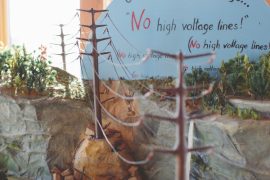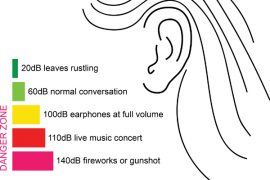Cassandra Sonko and Sina Davis are Creating Fertile Ground
Celebrated for its abundance of farmers’ markets, community gardens, high-end grocery stores and artisan restaurants, Madison is on one hand a foodie’s paradise.
But some citizens will tell you a different story as they struggle to feed themselves in a “food desert.” After the area Cub Foods and Walgreens closed, residents in the Allied Drive neighborhood are often left to eat meals at McDonald’s or shop for food locally at a Mobil gas station, where a box of cereal costs more than twice as much as it would at a Copps grocery store.
“This is a human rights issue. Food is not a privilege, it’s a right,” says community leader Cassandra Sonko, president of the Allied Community Cooperative, which was recently awarded a grant from the City of Madison to open a community grocery store in the neighborhood.
Food inequities in Madison mirror disparities in other aspects of life, as evidenced in the 2013 Race to Equity report, which cited glaring racial gaps in Wisconsin, including in education, employment and many other areas.
Allied Drive acutely reflects those disparities.
Just south of the West Beltline between Verona Road and Seminole Highway, Allied is home to nearly 3,000 people. According to the Allied Wellness Center and U.S. census reports, approximately 98 percent of Allied residents are people of color and more than half of the households earn less than $25,000 a year. Ninety-five percent of children participate in the free and reduced lunch program. Residents have limited access to employment, health care, childcare and transportation.
But residents are resilient and determined and, “It’s the warmest community,” Sonko says. “We just need people to invest in us.” They formed the Allied cooperative to strengthen the community. In 2015 they were awarded $300,000 for their plan to own and operate a neighborhood grocery store offering affordable and fresh foods.
Teaming up with the Willy Street Co-op and the UW Center for Cooperatives, the Allied cooperative hired out a marketing and feasibility study in June 2016. Other partners include neighborhood organizations, the Madison Apprenticeship Program, Dane County TimeBank and Nehemiah Corporation. Plans are to break ground on the store in 2018, bringing fresh food, jobs, a community space and a way to address the threats of diabetes, obesity and heart disease that often result from a poor diet lacking in fresh, healthy foods.
Sonko and neighbor Sina Davis stand out as social entrepreneurs determined to turn a food desert into a garden of healthy choices and neighborhood connectedness.
Davis is a warrior. From Chicago to Madison, she’s battled poverty, addiction, homelessness and even cancer. She’s soldiered on to become a trailblazer in the Allied neighborhood.
“When I moved from Chicago to Madison, I didn’t want to look back,” Davis says. “I wanted to be a great asset to my community.” That she is, having received an award in 2014 from the Wisconsin Council on Families and Children for her community work.
Davis was a founder of the Allied Community Cooperative and now sits on its board. The Cooperative is an umbrella for grassroots efforts, but the grocery store is taking center stage. “Residents are so excited about this store, to have fresh food and be able to prepare that for their families,” Davis says.
Davis advocates for the Allied neighborhood at city meetings and, in fact, was headed downtown to meet with the district attorney and police chief on a chilly June day. She’s quiet and relentlessly determined to improve life for Allied residents, including her 17-year-old daughter. She’s also an advocate for reforming the criminal justice system in Wisconsin. Her son is currently incarcerated.
Arriving in Madison in 2008, Davis went from living at the Salvation Army to transitional housing and finally Allied Drive in 2010. She got involved in Joining Forces For Families and the Allied Wellness Center. She founded a local chapter of Mothers in the Neighborhood. And she and others partner with UnityPoint Health-Meriter to provide health education.
Davis is an outreach queen: “I have a passion to get people involved, build relationships, bring people to the table.”
To her, a grocery store is a crucial missing piece of a community puzzle in dire disrepair, lacking many basic services, such as a local school. “We have so many children bused from Allied to other parts of the city. These kids need community,” she says. “They need to be able to go to a local grocery store so we can teach them how to shop for healthy food, how to budget and read labels.”
Davis is firmly rooted in her neighborhood. This summer, she’s contributing sweat equity to her Habitat for Humanity house while working at Porchlight, Inc., getting treated for ovarian cancer and continuing to volunteer. She adds, “If I know I can make a difference, I can and I will.”
In 2012, Cassandra Sonko had a health crisis: A heart attack followed by heart surgery. Later, gastric bypass surgery.
“I went into survival mode,” she says. “I didn’t know what to do to feed my family. I didn’t want to feed them from Walgreens. But I had no other choices. Unhealthy food almost wiped me out.”
As both a patient and a registered nurse, Sonko knew things had to change. Living on Allied Drive with her three children, Sonko met Davis and got involved with Mothers in the Neighborhood. She became an outspoken activist. She’s currently president of the Allied Community Cooperative and helps lead the charge to build the neighborhood store.
After her health crisis, Sonko researched the work of Michelle Obama. “I took her definition of a food desert to the City Council and I told them, this is not a health care issue, this is a health care crisis. The city could have done more, but it has finally been responsive.”
Born in Los Angeles but raised in Illinois, Sonko and her family moved to Allied Drive in 2011 and now lives in Sun Prairie due to health needs of her son with cerebral palsy. But she’s still active in Allied. She points out that while the Cooperative is currently focusing on a grocery store, Allied is still missing a school, library and clinic.
“You need food, clothes and shelter at the basic level to advance,” she says. “When you know better, you do better. Allied community is marvelous. But we can’t sustain it if we don’t see the larger community investing in us.”
Sonko currently offers health clinics to the homeless and dreams of becoming a community health nurse practitioner. “My mom is a nurse, my grandma is a nurse. It’s a talent that was passed down through my family,” she says. “The issues I see in our community, it’s always been about health care for me. It’s all connected.”
Come 2018, another piece of the puzzle should be in place with the new Allied grocery store, making the neighborhood that much healthier.
How much does food cost at the Allied Drive Mobil? Let’s find out.



